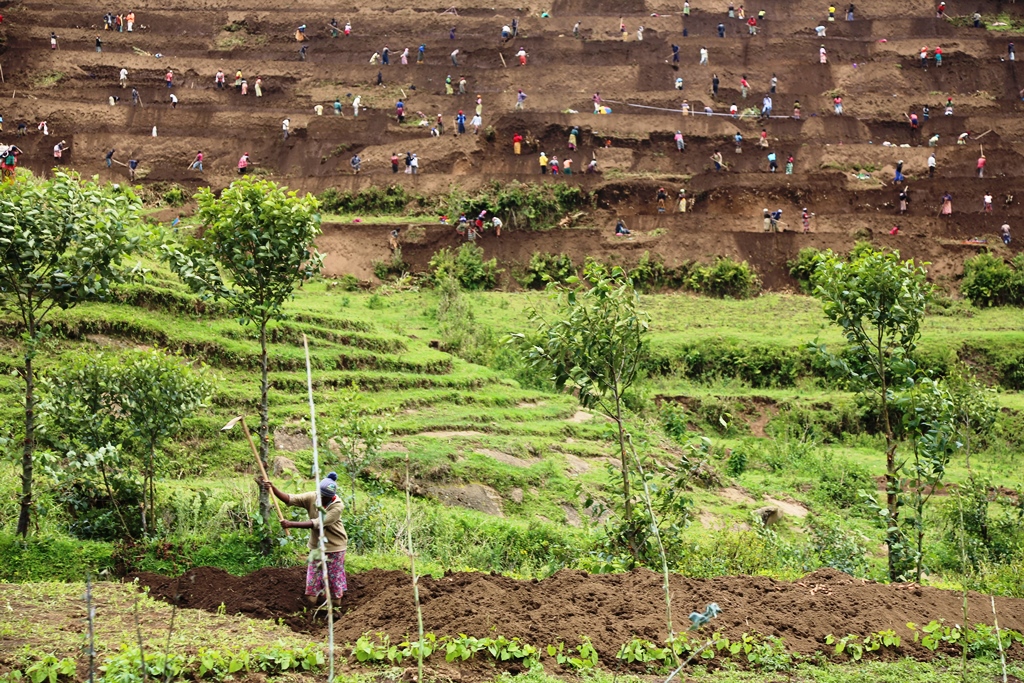Climate Justice
Mindset of Change
Hasta la Raiz by Natalia Lafourcade
If everyone in the world lived like people in the United States, we would need more than five earths to sustain our population. Our earth overshoot day is March 14th. If everyone lived like Americans, we would have completely used up all natural resources on the planet by March 14th of 2024.
Now, we're not the worst (that dubious distinction belongs to Qatar), but we're definitely very bad. By contrast, if everyone lived like the average person from India, we would only use 80% of the Earth's resources (overshoot.footprintnetwork.org)
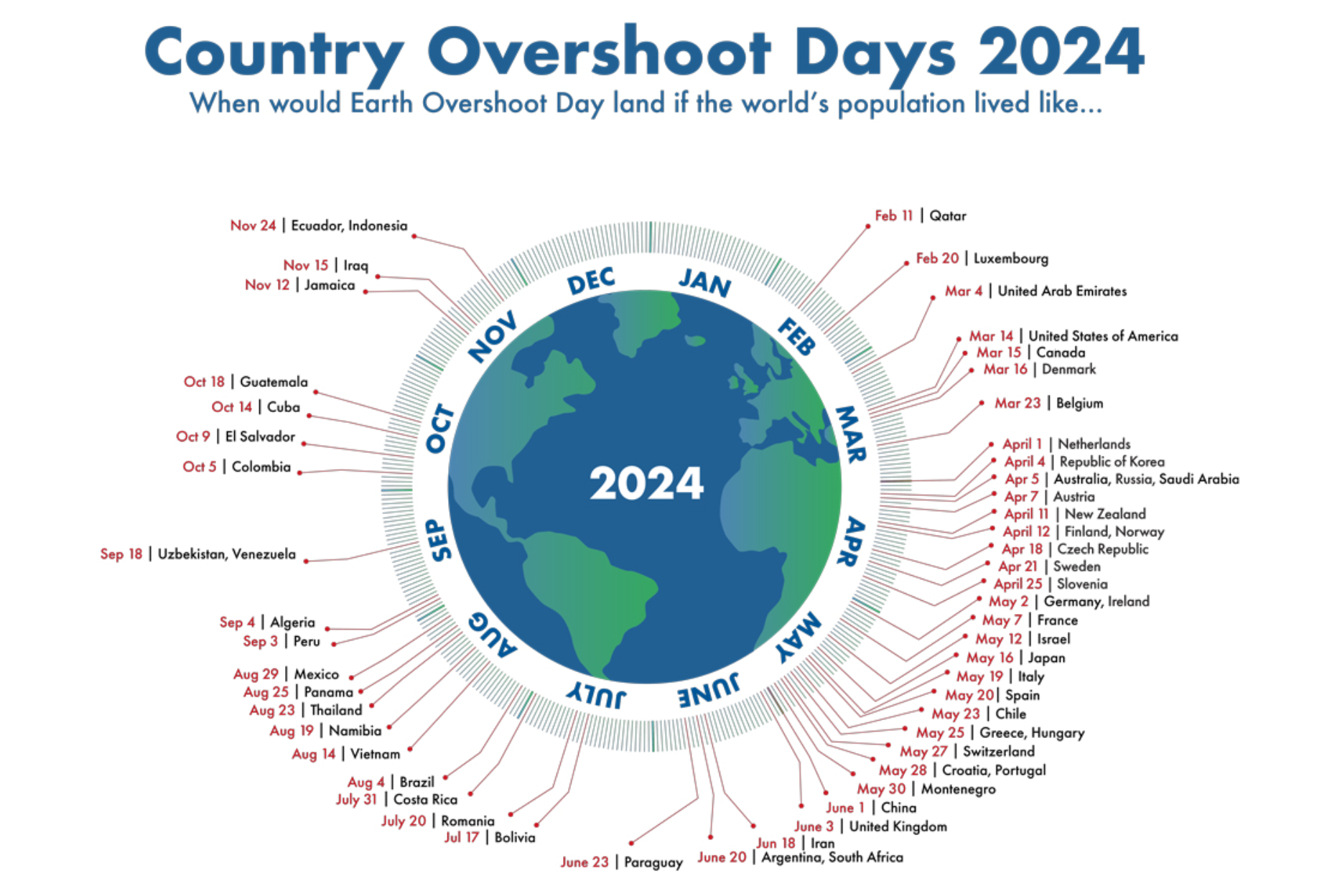
Perhaps even more relevant than current consumption patterns, developed countries are responsible for 79% of historical carbon emissions (cgdev.org). Despite our brief history, the United States is the leader on this front.
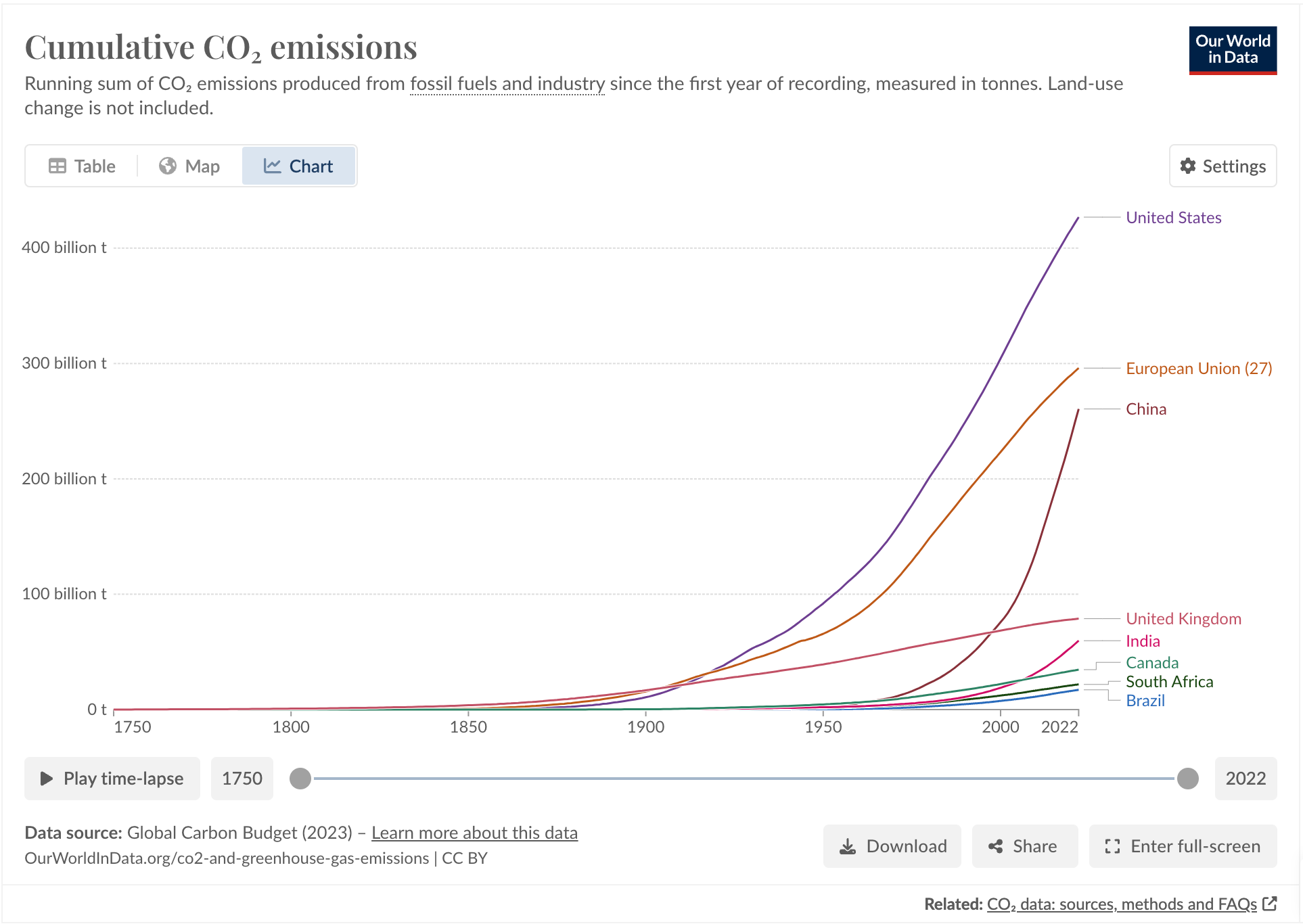
Although the climate crisis is primarily measured in carbon emissions, ecosystem degradation is a parallel and hugely contributing factor, and colonialism is largely responsible for ecosystem collapse across the world (columbia.edu). Colonial powers used colonies as sources of natural resources to fuel their own growth – usually extracting those resources, exporting destructive agricultural practices and wiping out indigenous wisdom at the same time. On this front, the title of Lead Destroyer falls to the UK (nhm.ac.uk), although much of Europe has contributed.
Nonetheless, after Qatar (whose total emissions are a fraction of the US' due to such a small population), the US remains the leader in highest emissions per capita as of 2021. China is now the leading emitter overall, but it still has far lower per capita emissions than the US. In other words, person for person, the US is still the worst (climate.gov).
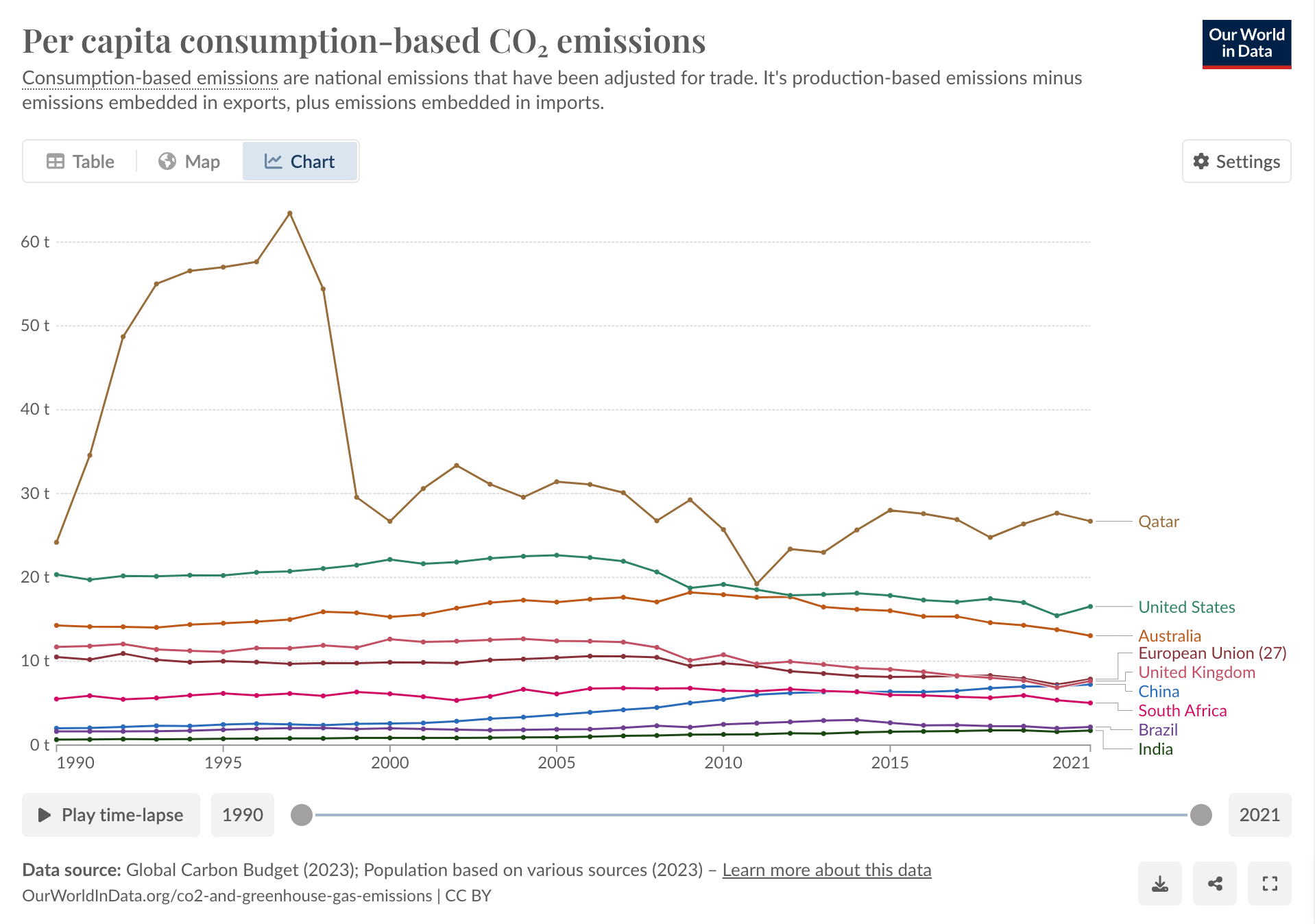
We are not alone. Higher and middle income countries produce more than 80% of the world's emissions (ourworldindata.org/inequality-co2).
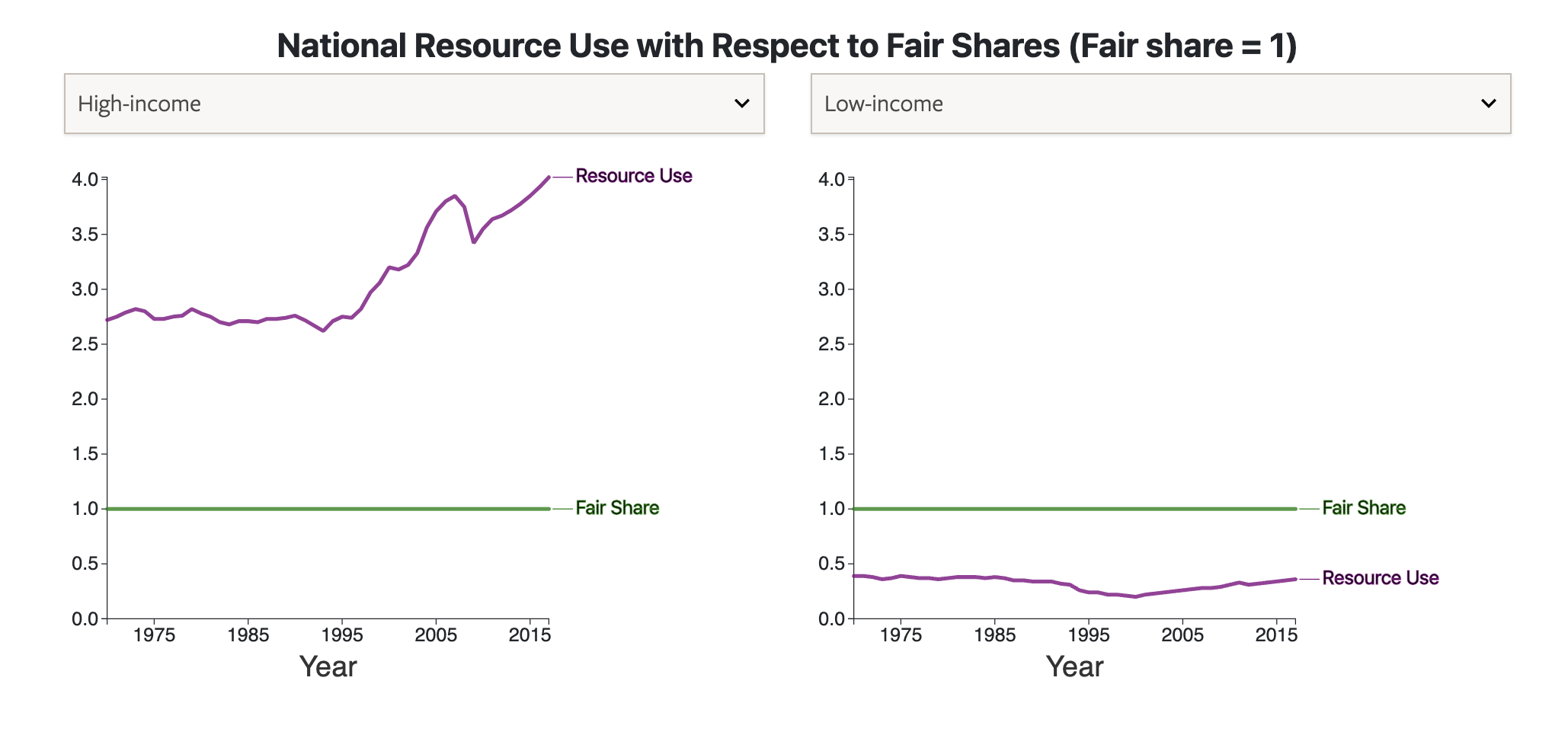
Consequences for the Developing World
Although the world's 74 lowest income countries only contribute 10% of global greenhouse gases, they will suffer the most from climate change.
- "Compared to the 1980s, they have already experienced approximately eight times as many natural disasters in the past 10 years."
- "By 2050...more than 200 million people [may have to] migrate within their own countries, pushing up to 130 million people into poverty and unravelling decades of hard-won development achievements."
- "Globally, warming of 2-3°C might result in more than 150 million additional cases of malaria worldwide...there will be 48,000 more diarrhoea-related deaths in children under the age of 15."
- "The probability of crop yield failures is projected to be as much as 4.5 times higher by 2030 and up to 25 times higher by 2050 across global breadbaskets."
- "By 2025, there will be 5 billion people on the planet, up from the current 1.7 billion who will be affected by water scarcity."
- "By 2050, 216 million climate refugees will have been displaced in six world regions, with the top three being in sub-Saharan Africa (86 million), East Asia and the Pacific (49 million), South Asia (40 million)."
- "Heat stress is projected to reduce total working hours worldwide by 2.2% and global GDP by $2.4 billion in 2030."
From a World Economic Forum report in 2023.
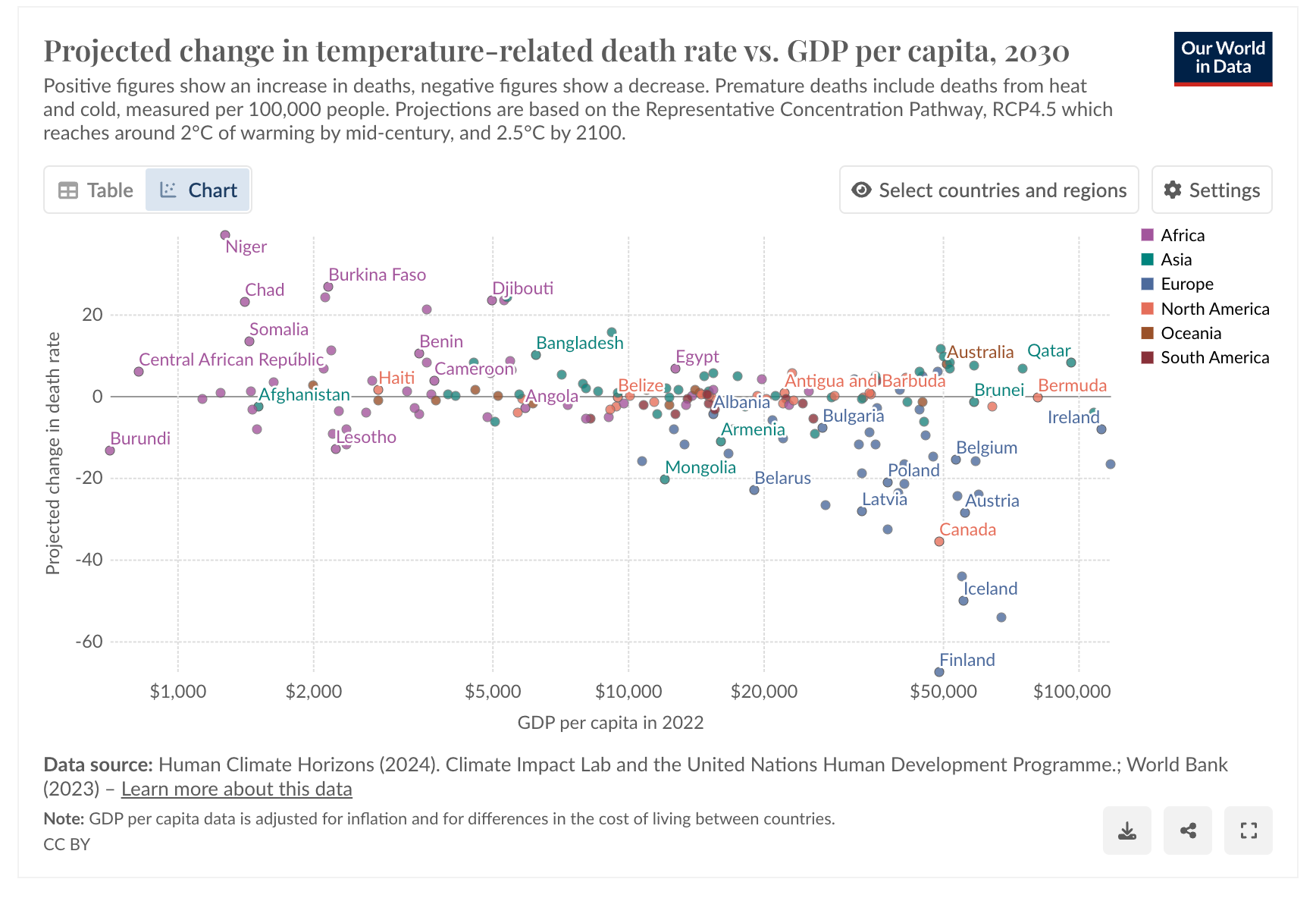
Overall, the climate crisis will reduce rates of education and increase rates of poverty across the developing world. Hunger, health threats and natural disasters will wreak widespread havoc, causing more deaths and refugees (usglc.org).
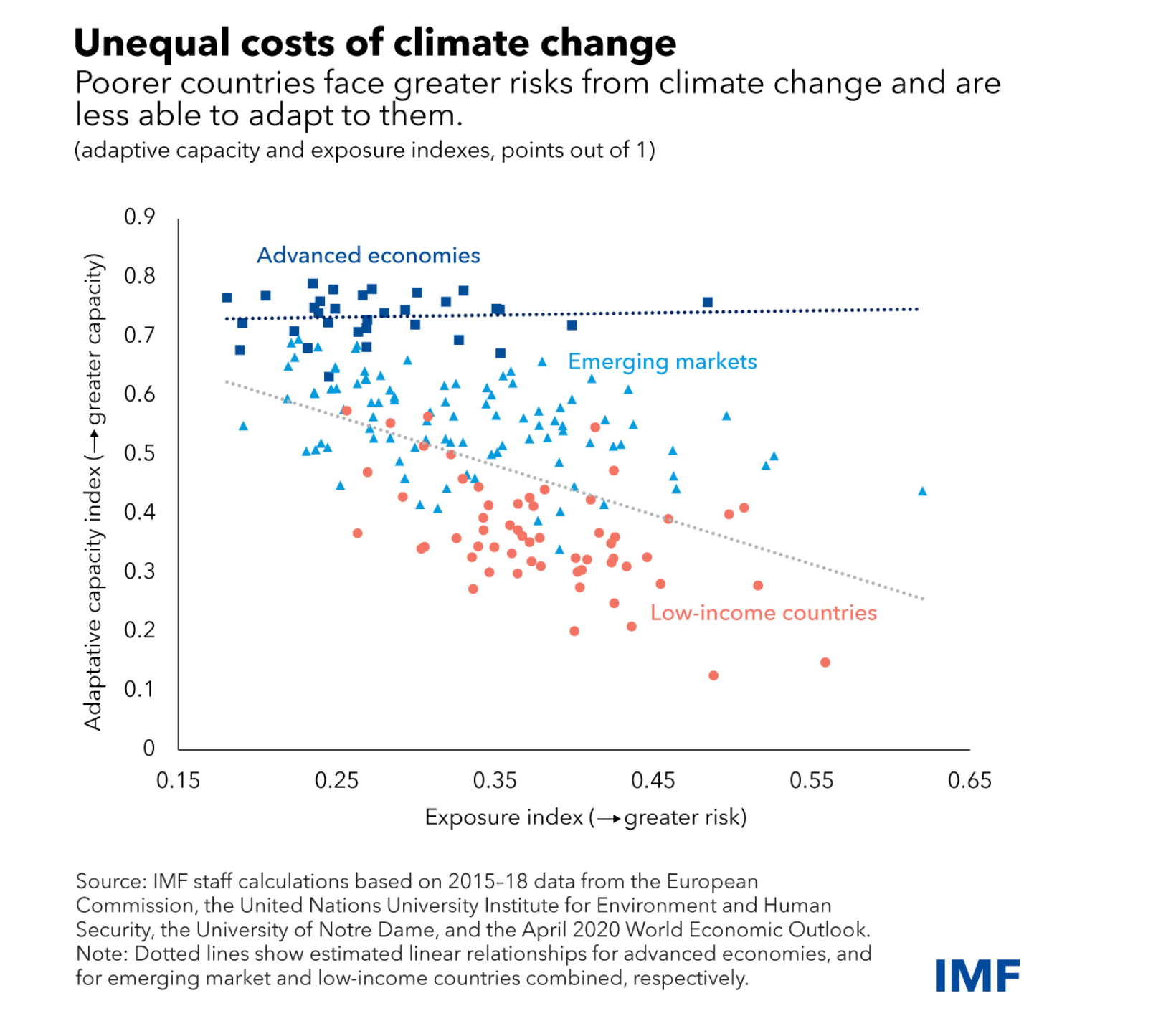
In addition to death and destruction, the climate crisis will also cause widespread destabilization as diminished natural resources and widespread migration increase economic and political tensions. Countries that the US relies on to produce microchips and cell phones, clothes and furniture, will become more expensive and less reliable (yale.edu).
Economic Outlook
'Climate change will reduce future global income by about 19%...with the poorest areas and those least responsible for heating the atmosphere taking the biggest monetary hit, a new study said.'
'Climate change’s economic bite...is already locked in at about $38 trillion a year by 2049, according to...the journal Nature by researchers at Germany’s Potsdam Institute for Climate Impact Research. By 2100 the financial cost could hit twice what previous studies estimate.'
'“Our analysis shows that climate change will cause massive economic damages within the next 25 years in almost all countries around the world, also in highly-developed ones such as Germany and the U.S., with a projected median income reduction of 11% each and France with 13%,” said study co-author Leonie Wenz, a climate scientist and economist.'
From AP News.
"Furthermore...economic prospects for today’s poor countries will disproportionately decline, since those countries, on average, begin with higher temperatures and are forecast to record especially large increases in temperature."
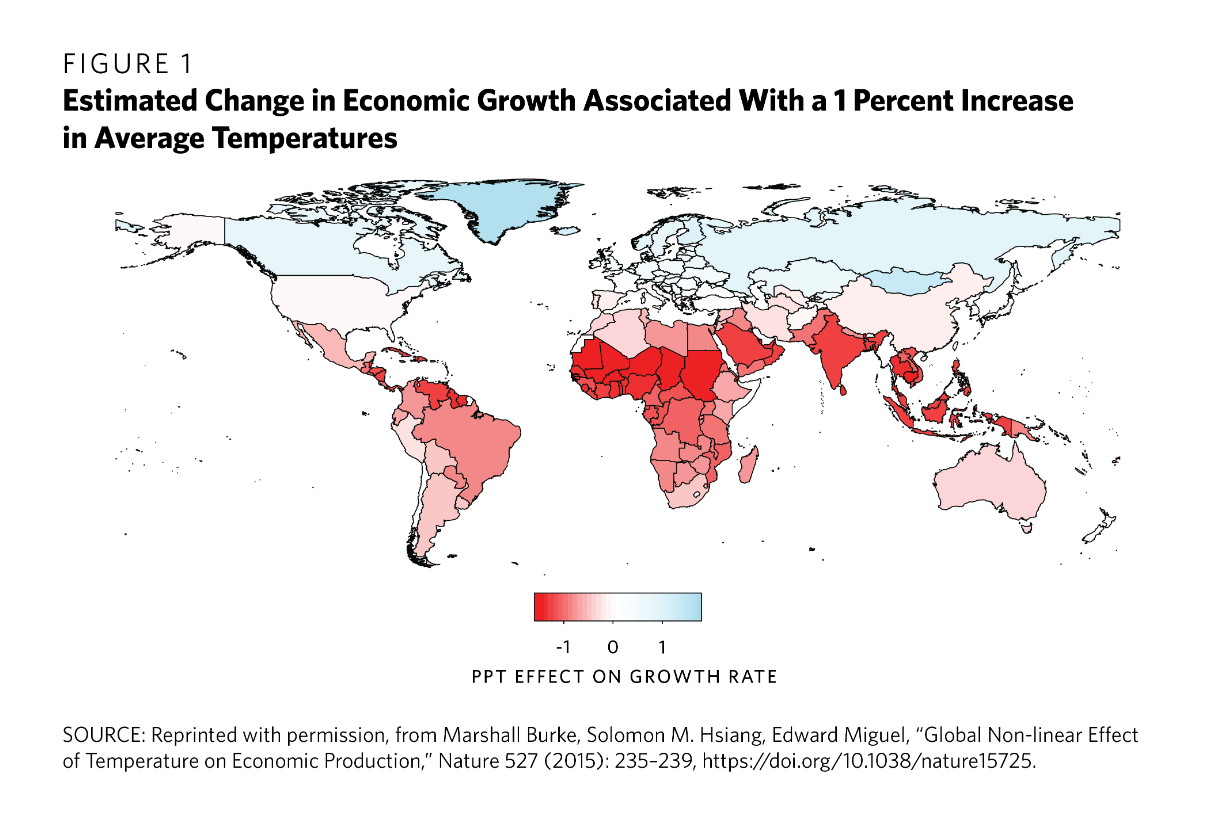
"Economic performance in the medium to long term is episodic in nature for all but the richest countries that remain at the technology frontier.13 Virtually all countries have experienced periods of rapid economic growth and periods of dismal growth. Comparative performance is explained by the superior ability of some countries to sustain growth; poor countries have a greater propensity to reverse. In other words, shocks, and how they are managed, play a large part in explaining comparative economic performance."
"If climate change augurs a world of more frequent and intense shocks, sustained episodes of fast economic growth—so-called growth miracles—will become harder to pull off. The result will be fewer poor countries succeeding in converging on rich country income levels, compared to a world without climate change. This comes at a time when convergence has become more commonplace since the start of the twenty-first century."
From Carnegie Endowment research.
In other words, the entire world will be economically impacted by the climate crisis, but for developing countries it will become exponentially more difficult to rise out of poverty. Not only can they not follow the path of the developed world - colonizing other countries, extracting natural resources, and using absurd amounts of energy to catalyze fast growth - but they will also experience more economic shocks from natural disasters, labor and resource shortages.
The Hard Truth
It is fundamentally unjust that those who have caused the climate crisis – who continue to perpetuate resource-intensive, unsustainable lifestyles – will be the least affected by it, while people in developing countries, who have contributed the least, will be the most affected. Millions more people will die, face hunger and disease, and extreme poverty than if we had curbed climate change earlier, or if we do not hit the minimum targets laid out in the Paris Agreement.
In 2022:
"If the world managed to meet the 1.5°C target, 91% of the projected 3.4 million deaths would be avoided. If climate heating overshoots 1.5 °C but is limited to 2°C, the number of deaths avoided drops to 50% — underscoring how crucial it is to limit global warming to 1.5°C."
(v-20.org)
When signing the Paris Agreement, and in following COP (conference of the parties) meetings, countries around the world agreed to set targets to limit their greenhouse gas emissions. These Nationally Determined Contributions would, in theory, help limit the global temperature increase from pre-industrialization levels to first 1.5°C, and if that was impossible, 2°C.
You can find emission reduction targets (NDCs) by country here: climateactiontracker.org. Even if we can accomplish them (a rather dubious proposition in itself), they will not be enough. We will overshoot our minimum allowable increase in global temperature by 150%. That means the cost in human life (and ecosystems) will be even higher than commonly modeled.
In 2024:
"As things stand, fully implementing unconditional Nationally Determined Contributions (NDCs) made under the Paris Agreement would put the world on track for limiting temperature rise to 2.9°C above pre-industrial levels this century. Fully implementing conditional NDCs would lower this to 2.5°C."
(unep.org)
You can explore climate vulnerability by country according to biophysical, health and economics vectors here: v-20.org/climatevulnerabilitymonitor.
In addition to NDCs, during the Paris Agreement, some developed countries agreed to contribute to a Green Climate Fund to help developing nations finance adaptation and mitigation to climate change (worldbank.org). This was a key element in support of climate justice.
In total, over 40 billion USD have been pledged to the Green Climate Fund, with the US pledging $3 billion in the initial mobilization, and a further $3 billion in 2023 during the second replenishment (nrdc.org). President Trump was notoriously hostile toward the GCF and did not contribute to the first replenishment in 2019. He also pulled the US out of the Paris Agreement, a set back for our targets.
Although setting a strong NDC and contributing to the GCF is by no means easy in the world of American politics (or indeed, in the political climate of many developed nations), it can also feel like a pittance. While Biden and Trump argue over a $1 billion contribution to the GCF, the Senate appropriations committee proposes $825 billion in defense spending (appropriations.senate.gov).
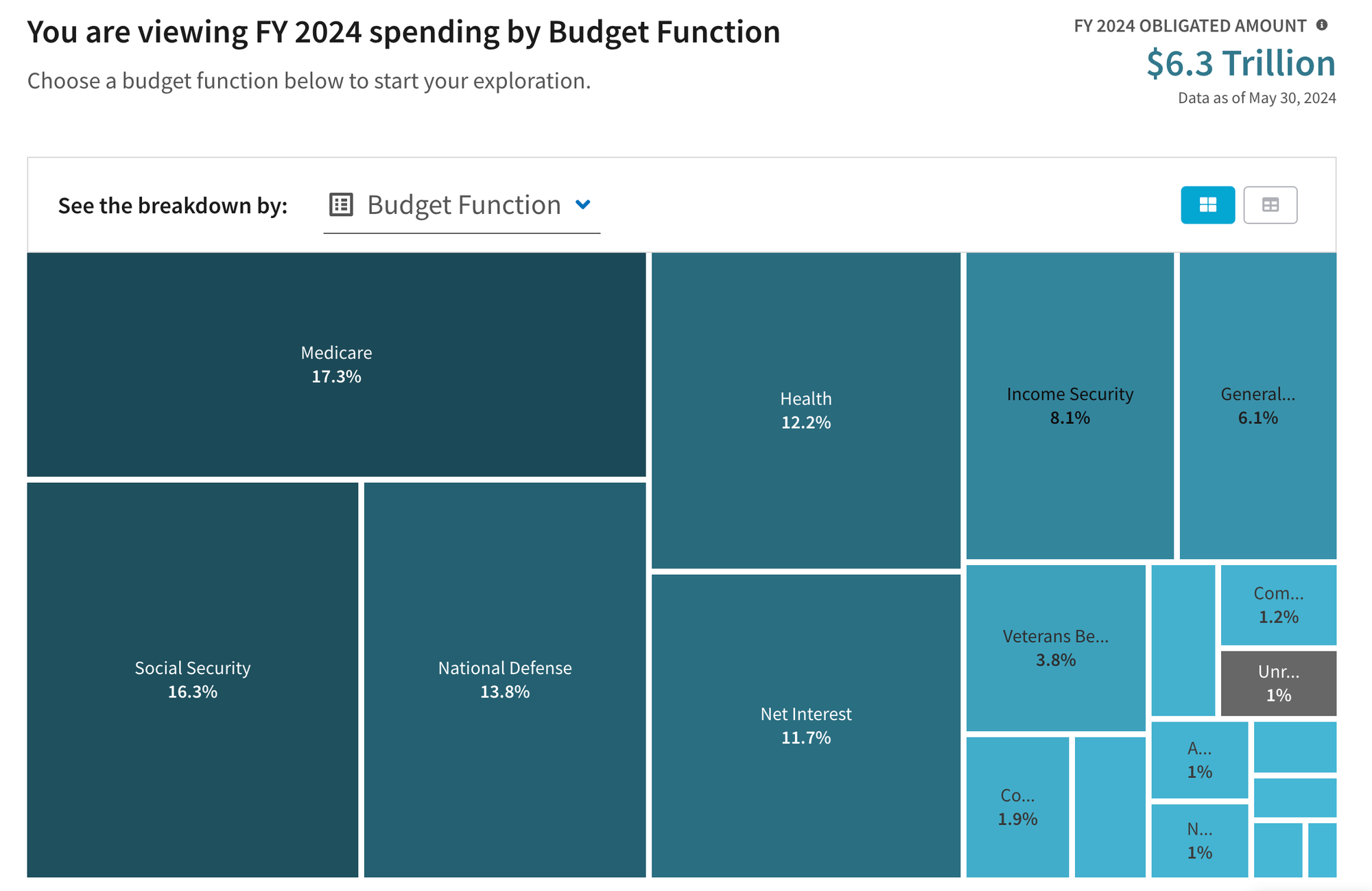
Let's end on a more positive note, shall we?
While it's a sad fact that, in the developing world we use more than our fair share of natural resources, it also means we have outsized impact when we change our behavior. As individuals, if we cut our emissions in half, it allows for the emissions of multiple people in the developing world. In other words, they have more room to try to achieve a better life - better health, education, financial stability - without contributing to the climate crisis.
Behavior change in the developed world can offset the development of poorer nations. Considering that their needs are on the level of clean water, vaccines, steady employment, education for their children, and mine are on the level of deciding what to have for dinner or whether I really need another pair of shoes, it seems like an easy strike for climate justice. I'll have vegetarian for dinner, thank you.
And if you're really feeling like assuaging some guilt, you can donate directly the UN Adaptation Fund to help countries adapt to climate change. Voting is good too.
